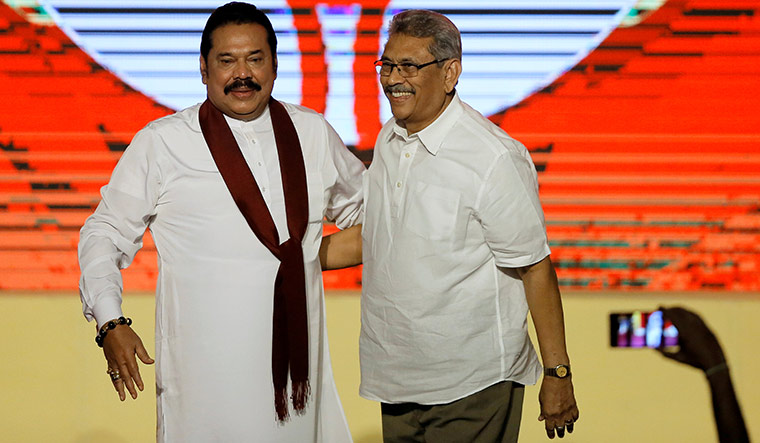MORE THAN TWO months have passed after Gotabaya Rajapaksa was elected president of Sri Lanka and most people find him to be completely different from his brother, former president Mahinda Rajapaksa. Gotabaya, who was defence secretary under Mahinda, contested the presidential elections as the candidate of Mahinda’s Sri Lanka Podujana Peramuna. But he seems to be plotting an independent course as president, despite appointing Mahinda as prime minister.
Gotabaya shuns the pomp and pageantry so loved by Mahinda. Sri Lankans were stunned when the new president opted for a simple ceremony to inaugurate the fourth session of the parliament on January 3. There was no ceremonial 21-gun salute or mounted police escort, which used to be the norm during Mahinda’s presidency. The two brothers have distinct sartorial styles as well. While Mahinda prefers the white national dress and the red shawl, Gotabaya delivered his inaugural address dressed in a dashing suit.
One of Gotabaya’s first orders as president was not to have his photographs in government offices. When an enthusiastic supporter put up his life-sized portrait in a public place, he immediately ordered it to be taken down. When Mahinda was president, his photographs, posters and cutouts were seen at almost every street corner and in every government office.
Gotabaya seems to have a different approach towards handling dissent. The first street march by university students after Gotabaya took over ended in a discussion. The president tweeted that instead of the usual tear gas and baton charges that greeted student protests, he had invited them to his office so that they could discuss their issues with the officials concerned.
Gotabaya has adopted a direct approach towards policy issues. Last month, he accepted the long-standing demand of plantation workers of Indian origin for a minimum daily wage of 1,000 Sri Lankan rupees. The announcement came just before ‘Thai Pongal’, a major festival of Sri Lankan Tamils. The past two months have seen Gotabaya’s critics, especially the Tamils and Muslims, approving of his style of functioning and his policies.
Gotabaya was unusually forthright in stating that federalism was not the way forward for Sri Lanka. He told the Tamils that the unitary status of the country was paramount. Instead, he promised them economic equality, which he said would be implemented by a stable government and a powerful presidency. He also categorically ruled out diluting the powers of the president.
Gotabaya did not shy away from speaking out about the rights of the Sinhalese. He asked the Tamils and the Muslims to respect the will of the majority. “The people who elected me desired a profound change in the political culture of this country. They rejected political agendas founded on race. The majority of the people proved that it is no longer possible for anyone to manipulate and control the politics of this country by playing the role of kingmaker,” said Gotabaya, referring to political parties representing Muslims, which have a tradition of bargaining with the party in power. “I invite the concerned politicians to understand this reality. I call upon all of you to join together in the national undertaking to develop this country and to reject the politics based on petty agendas that have sown divisions in our society.” In a meeting with UN resident coordinator Hanaa Singer in Colombo, Gotabaya said he would develop the economy of the war-ravaged Tamil-majority Northern Province even if Tamil political parties did not support the initiative.
Responding to the president’s policy statement, Tamil National Alliance leader R. Sampanthan told the parliament that his party was prepared to work with Gotabaya. “Ever since the enactment of the 13th amendment in 1988, the Tamil people have decided at every election that they will work for the sharing of powers within the framework of a united, undivided, indivisible Sri Lanka,” he said. “Gotabaya Rajapaksa, as president, will work towards the achievement of those objectives. He will have the absolute support of our party.”
How Gotabaya will engage with the TNA in the longterm will be interesting. He has asked his ministers to help nearly 3,000 Sri Lankan refugees in India who have expressed the desire to return. Those who work with the refugees appreciate Gotabaya’s initiatives. “The president is keen to facilitate their safe return and to see that they resume their lives in Sri Lanka,” said S. Sooriyakumari, who heads the Sri Lankan operations of an organisation which facilitates the return of Sri Lankan refugees from India.
“We are trying to transport them from India by ship so that they can take their belongings as well. The cooperation we have received so far under the instructions of President Gotabaya Rajapaksa should be commended,” said Sooriyakumari. The first batch of refugees are expected to return this month and the Sri Lankan government has instructed that they should be resettled in their original land in the north and east of the country.
Gotabaya is also taking steps to induct more members of the minority communities into the country’s police force. As Sinhalas dominate the police and the army, minorities refer to them as “Sinhala police” and “Sinhala army”. Gotabaya plans to recruit 3,000 candidates from the north to the police force to fill vacancies at the constable and sub-inspector levels.
Meanwhile, Gotabaya did not go back from his decision to appoint Brigadier Suresh Sallay, a Muslim, as head of the State Intelligence Service, despite widespread opposition. Retired army commander and UNP MP Sarath Fonseka, in fact, argued in the parliament that such an important post “should not be given to a Muslim”.
Well-known columnist and intellectual Ameer Ali commended Gotabaya for not giving into racism and relying solely on merit. Ali, a staunch critic of Muslim parties and Buddhist supremacists alike, however, warned that going forward, Gotabaya’s progressive vision might be hampered by pressure from Sinhala supremacists. “His focus is on meritocracy,” said Ali. “Reining in religious supremacists is the key and protection of pluralism is a must.”



